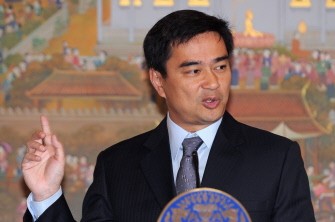BANGKOK, May 6, 2011 (AFP) - Thailand's premier fired the starting gun Friday for the first general election in the politically divided nation since deadly protests rocked Bangkok last year, with a vote expected by early July.
British-born, Oxford-educated premier Abhisit Vejjajiva, whose term finishes at the end of this year, is gambling on early polls to propel him to a second term and silence critics who say he has no popular mandate.

Abhisit, the head of the elite-backed Democrat Party, said he had submitted a royal decree to King Bhumibol Adulyadej for the lower house to be dissolved for a poll set to be held in late June or early July.
"It's done already," he told reporters before leaving for Indonesia for a summit of Southeast Asian leaders.
He did not reveal the election date but said he would hold a news conference on Monday.
By law, polls must be held between 45 and 60 days after house dissolution, which would take effect once the decree is signed by Thailand's 83-year-old monarch, who has been hospitalised since September 2009.
Abhisit's party -- the country's oldest, with a support base in Bangkok and the south -- has not won a general election in nearly two decades and faces a struggle to cling to power, even with the support of its coalition partners.
Abhisit took office in a 2008 parliamentary vote after a court ruling threw out the previous administration, and he is accused by his political foes of being an unelected puppet of the military and the establishment.
The vote comes at a time of heightened political sensitivity for the country, which remains deeply divided a year after a military crackdown on opposition protests in the capital that left 90 people dead, mostly civilians.
Parties affiliated to fugitive ex-premier Thaksin Shinawatra have won the most seats in the past four elections, but the former tycoon was toppled in a 2006 coup and courts reversed the results of the last two polls.
Abhisit defied sceptics last year to survive a crippling political crisis marked by a series of clashes between demonstrators and armed troops in Bangkok. It was the country's worst political violence in decades.
Many of the mainly rural, working class Reds are loyal to Thaksin, who lives overseas to avoid a jail sentence imposed in absentia for corruption, but is considered the de facto leader of the opposition Puea Thai.
The opposition party, which is particularly strong in the rural north and northeast, has not yet announced its candidate for prime minister, although Thaksin's sister Yingluck Shinawatra has been touted as a top contender.
Thailand has suffered years of political instability, punctuated by unrest and military intervention, with 18 actual or attempted coups since 1932, when the country became a constitutional monarchy.
The current army chief has ruled out another coup, but that has not dampened speculation of possible military intervention.
"A coup is always possible but I don't think if there is one that it will be in the pre-election period," said Pavin Chachavalpongpun, a Thai political expert at the Institute of Southeast Asian Studies in Singapore.
"It must be more likely in the post-election period, especially if the results are unacceptable for the elite."
Pavin believes a coup would be a "last resort" for Thaksin's foes.
"They can use other tactics less damaging than a coup, like the intervention of a court again," he said.
Thaksin, a former billionaire telecoms tycoon who led his party to landslide victories in 2001 and 2005, is hailed by the Reds for his policies for the poor while in power.
But he is regarded by the Thai ruling elite as authoritarian, corrupt and a threat to the revered monarchy, and faces terrorism charges in Thailand, accused of bankrolling last year's protests and instigating unrest.
The authorities have clamped down on Red Shirt media and last month police raided more than a dozen local radio stations sympathetic to their cause.
























